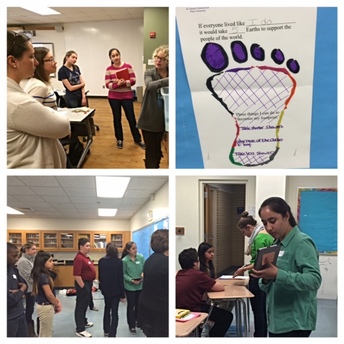
Saint Mary’s professor Dr. Amy Gillan developed the workshops with her secondary science methods class and her Education 447 class, who researched and wrote the curriculum. Dr. Gillan said the goal of the workshops is to teach aquaponics with a focus on sustainability issues. Shella Raja, a Notre Dame biological science senior with a minor in sustainability studies, has been working on the workshops for her capstone project. “We formed an interdisciplinary team of secondary education, science, and aquaponics specialists. A group from Saint Mary's College and IUSB wrote the curriculum while Jan [Pilarski, co-founder of Green Bridge Growers] and I worked on funding, grants, approvals, and logistics of getting the program on its feet,” she said.
Shella said she wanted to partner with Green Bridge Growers because she felt the venture is doing something great for the community in a unique and innovative way. “They represent what more organizations should try to accomplish as far as creating opportunities for people of all abilities and promoting sustainability at the same time,” said Shella.
The curriculum is hands-on, with opportunities for middle school students to design, test, and evaluate their own miniature aquaponics systems. The students will also get a chance to examine their own ecological impact in terms of the foods they eat and how and where those foods are cultivated.
Throughout the workshops students will be learning about the environment, stewardship, plants, fish, aquaponics, and more! Each workshop will begin with an agenda. Then students will go through daily activities with the help of the volunteers from Notre Dame and Saint Mary’s College. In the later sessions, they will build mini aquaponics demo systems and display them at a concluding science fair. Shella thinks this part of the workshops will be the most memorable for students because they actually get to build something and see it work. Four volunteers from Notre Dame and Saint Mary’s College will be present to help during the workshops and the curriculum extends over five days.
Dr. Gillan is hoping that students will come away from the workshop series excited about science and design, gaining knowledge about what they can do to reduce the extent of their ecological impact on the Earth AND how aquaponics fits into that. She says, “We think that this curriculum will be particularly effective for middle school students because it is primarily hands-on, methodological, and calls for creativity”.
Shella hopes this sets us up for a long-term partnership with Edison Intermediate and potentially other schools in the future. She is hopeful that students will gain an interest in sustainability for its versatility in all areas of life.
To parents and teachers interested in learning more about the program, Shella reports that “while this is a pilot program, we have worked so hard to bring this program to life. The good news is it's a great way to keep students engaged and interested in science outside of school!”
Shella’s favorite aspect of the program is that middle school students get to learn about sustainability in a unique way through aquaponics education. While aquaponics has been introduced to the curriculum at other schools, the Green Bridge Growers curriculum breaks new ground by incorporating the learning styles of students of different abilities, including those with autism. Dr. Gillan and Shella both stressed, “Inclusivity is a big positive of the program”.
Sounds like fun doesn’t it?!
Check out the workshop website http://educateaquaponics.wix.com/aquaponics-education
Visit the Green Bridge Growers website at: www.greenbridgegrowers.org. Find us also on Facebook, Twitter, Instagram, Pinterest, and be on the look for our upcoming newsletter!
--Nikki Charter

 RSS Feed
RSS Feed
